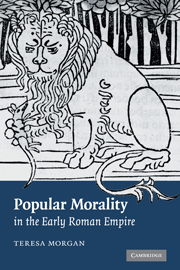Book contents
- Frontmatter
- Contents
- Preface
- List of illustrations
- List of tables
- List of abbreviations
- 1 Introduction
- PART ONE
- PART TWO
- 7 The language of morality
- 8 Moral authorities
- 9 Time and morality
- PART THREE
- Conclusion
- Appendix 1 The political and literary connections of Babrius
- Appendix 2 The definition of a miscellany
- Appendix 3 Popular morality and philosophical doctrine
- List of papyri
- Bibliography
- Index
7 - The language of morality
Published online by Cambridge University Press: 27 October 2009
- Frontmatter
- Contents
- Preface
- List of illustrations
- List of tables
- List of abbreviations
- 1 Introduction
- PART ONE
- PART TWO
- 7 The language of morality
- 8 Moral authorities
- 9 Time and morality
- PART THREE
- Conclusion
- Appendix 1 The political and literary connections of Babrius
- Appendix 2 The definition of a miscellany
- Appendix 3 Popular morality and philosophical doctrine
- List of papyri
- Bibliography
- Index
Summary
Life is very sweet, brother; who would wish to die?
George Borrow, Lavengro ch. 25.So far, we have dealt with the content of popular morality: what is approved or disapproved of in sayings and stories. In the next three chapters, we turn to the reasons why certain things are approved or disapproved of. We focus first on the language of moral comment itself, laying out its rich diversity, exploring how far terms and images run in ‘families’ (using images of the natural world, for instance, or from religion) and investigating whether certain ranges of language are consistently associated with particular actions or qualities. We shall look at the verbs in moral statements to see what basis they offer for action. Finally, we shall look briefly at a topic which is of great interest to philosophy and high culture, but which has only a limited presence in popular morality: the internal condition of the ethical agent.
Of our sources, proverbs and gnomai are by far the most useful for this exercise. The epimythia of fables offer a limited range of adjectives expressing praise or blame, and rather more verbs telling one in various ways to do or not to do something. Similarly, it is generally in the introductions to exemplary stories, if anywhere, that we find explicitly evaluative language, and its range is not wide. Proverbs and gnomai, in contrast, abound in colourful and explicit terms of praise and blame, and it is with the simplest of these that we begin.
- Type
- Chapter
- Information
- Popular Morality in the Early Roman Empire , pp. 191 - 206Publisher: Cambridge University PressPrint publication year: 2007



